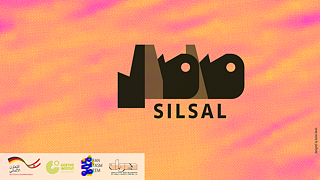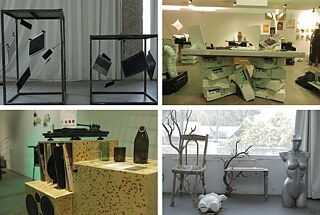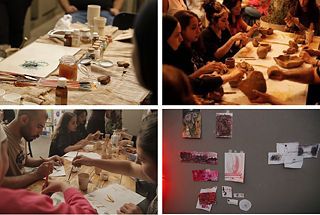SILSAL صلصال Design Exhibition & Event

Through the SILSAL صلصال Design Exhibition & Event in October 2022, the Goethe-Institut celebrated four successful years of the initiation of its project FANTASMEEM in Lebanon, as well as the closing of the “Regional Circular Design & Material Innovation” programme, which was implemented in 2022 together with our sister projects in Goethe-Institut Jordan (Takween) and Goethe-Institut Iraq (Khan al fan). The event was facilitated and curated by “Diwan of Culture, Design and Innovation (DCDI)”, a new, inclusive, and multidisciplinary creative hub in Lebanon.
Over the period of three days on October 27, 28 & 29, the event put together a program combining a Design Exhibition, Installation Arts, a Culinary Design Experience, a Contemporary Artistic Musical Performance, three Artistic Workshops, and a Discussion Forum. The event was also a perfect networking space for more than 260 creative and like-minded individuals from a variety of fields, expertise, and countries.
The Design Exhibition showcased for three days the products & innovative materials developed by 22 creatives participating from Lebanon, Jordan and Iraq. The designers exhibiting from the “Regional Circular Design & Material Innovation” program, also documented and showcased their alternative processes and experiences pushing toward an expansion of the discourses in sustainable design as a result of their participation in the programme, which focused on reconsidering the approach to technical innovation with an intensive effort on sustainable, dynamic and waste free products. The designers who participated in the exhibition are as follows: Abed Riadh, Reem Hilal, Dua’a Abdelhadi, HannenJaafreh, Stephanie Korab, Ahmad Aweik, Ghenoi Daher, Tasneem Zraikat, Michel Breidy, Ala’ Janbek &Hala Balaa, Al Batol Al-Sarraf, Al Hakam Hassan, Chantal Mhanna, Charbel Sayah, Ghenwa Kataya & Iman Najjar, Mohamad Chalabi, Niga Salam, Sarbast Burhan, Sheelan Saban, Sokar Sharif, Layan Al Nimer.

The Installation Arts took up the theme “Future is wasted. Waste is our future.” This theme was curated by Ali AbuAwad, SILSAL’s creative director and it was brilliantly embodied by architect/ scenographer Edwin Samaha & artist Patrick Khoriaty, who structured and designed the exhibition space from e-waste materials to convey the relationship and contrast between innovation and waste. The scenography theme was a reminder of how innovative material can be toxic, how technology if not well calculated from design to manufacturing to consumption can just be another wasted product to be added to the pile. A dominating “Mother-board” piece installed at the exhibition ceiling (instead of “Mother-nature”) was a reminder of how innovation could one day turn into harmful waste. As for the exhibition designers' stands, they were each designed uniquely from e-waste material rather than renting or designing plain white podiums. Visually they struck a stunning distinction between the innovative & sustainable design and the e-waste technology, poking everyone to beg the question: “Is innovation useful when it is not sustainable?”
A Culinary Design Experience was arranged by Josephine Abou Abdo, a food designer, founder of “Malfoof,” and one of FANTASMEEM’s alumni. On the opening night, Josephine created simple yet creative atmosphere by elevating simple seasonal local vegetables & fruits and presenting them in the purest forms: hanged, cut, displayed. Guests were invited to sit with the food makers on a communal table of only humble homemade ingredients, where they got to mix and match, listen to where the food came from, experience the taste of the villages in jars, and connect with the land.

A Contemporary Artistic Musical Performance was delivered by OVIID with an immersive art installation by Gerard Rechdan. On the opening night, the band performed songs in English & Arabic, featuring rhythmic prose infused with electronic influences, rebirthing heritage, folklore, and nostalgia. Inspired by Kraut, Oriental & Electronica, OVIID shook their listeners through a message of empowerment. Gerard Rechdan (a multidisciplinary designer) converted the stage to a capturing and insightful visual. He projected designs reverberate in rotation, symbolizing the never-ending cycles of life and its continuous flow.

Three Artistic Workshops were held on the second & third day of SILSAL. The workshops were open to the public upon registration and they were received with high demand and were all fully booked! Many creatives participated from different fields: graphic design, interior design, architecture, art directors, fashion designers, makers/fabricators, and visual artists. The three workshops were:
- Earth Pigment Paint Workshop by Mirella Salame: The workshop focused on making off-the-grid, self-sufficient and natural paint from earth rocks and other natural materials. Also, participants had the chance to demonstrate and practice the watercolor method, and get introduced to the egg tempera.
- Clay Sculpting by Emné Mroué: This workshop allowed the participants to experiment with different techniques and use a wide variety of materials. Participants had the chance to carve, model with clay, assemble by welding, work with stone, metal, ceramics, wood and many other materials.
- Wild Ink Workshop by Dahlia Barakat: Through this workshop, participants learned various ways to make their natural fruit & veggie pigments from ingredients such as berries, mushrooms, and more. The pigments were used to create various types of paints to fulfill artistic necessities in inexpensive and readily accessible methods.

A Discussion Forum under the title “Sustainability and Cultural Colonialism: Remnant Design” was held on the last day of SILSAL. The panel was organized in partnership with “Living Arts International” and live streamed on DCDI’s YouTube channel. The panel discussion was moderated by Hanan Bou Akl and it featured the following panelists: Philippa Dahrouge, Sara Rita Kattan, and Karim Nader. Starting from the concept that design is a philosophy, a practicality, and a human right, the panelist argued that design is used to shape one’s own tools & environment. They raised questions such as: Where do the materials that we encounter in our daily commuting, food servings, destinations, devices we employ, companies we work for, tables we utilize come from to service us? What journey did these materials take? How long have they traveled? Are they taxed or rather who taxed them? They highlighted the fact that until we circle back to the origin of this issue, the design processes, products we use, and their sustainability will reflect and assume our colonial policies and cultural dichotomy. The Panel talk lasted 2 hours and was divided into 4 sections: 1) Sustainability at a glance; 2) Sustainability & Cultural Colonialism; 3) Sustainability vs. Political Power; 4) Challenges & Tools.
